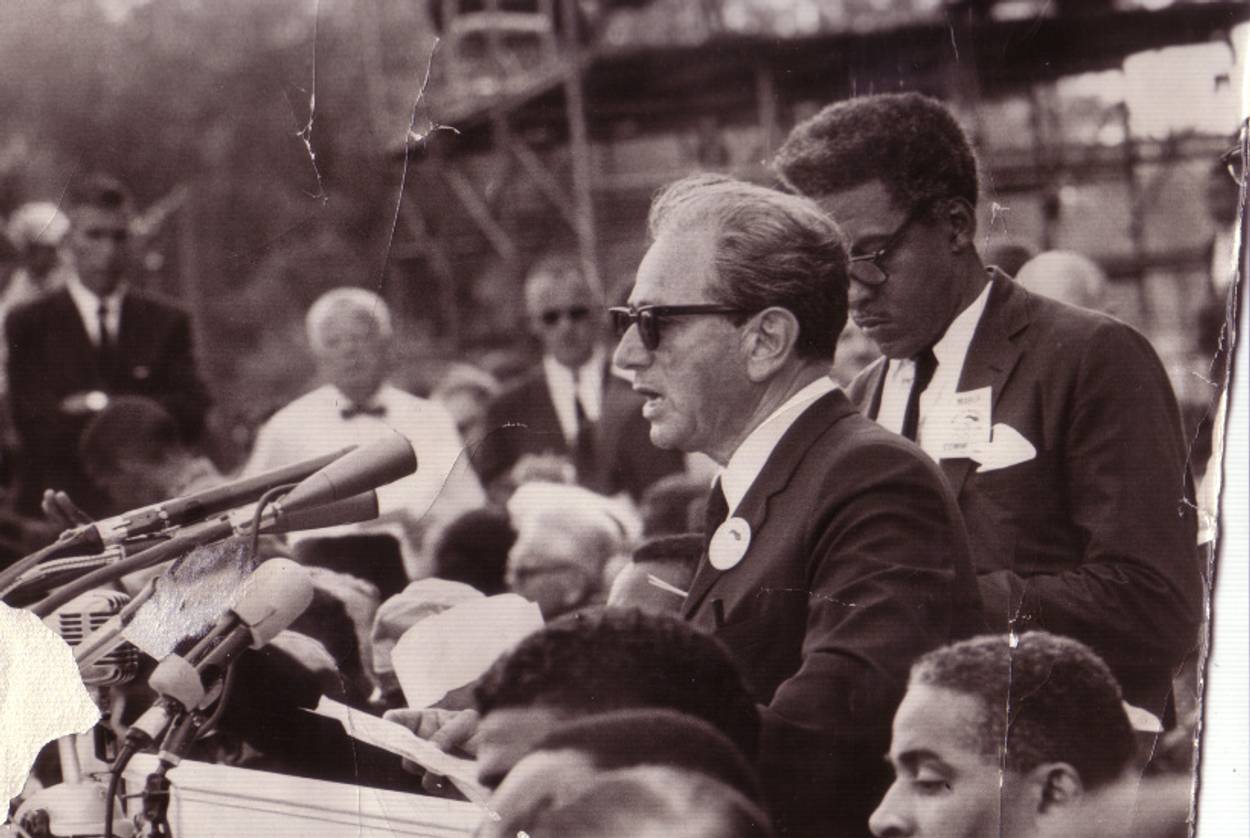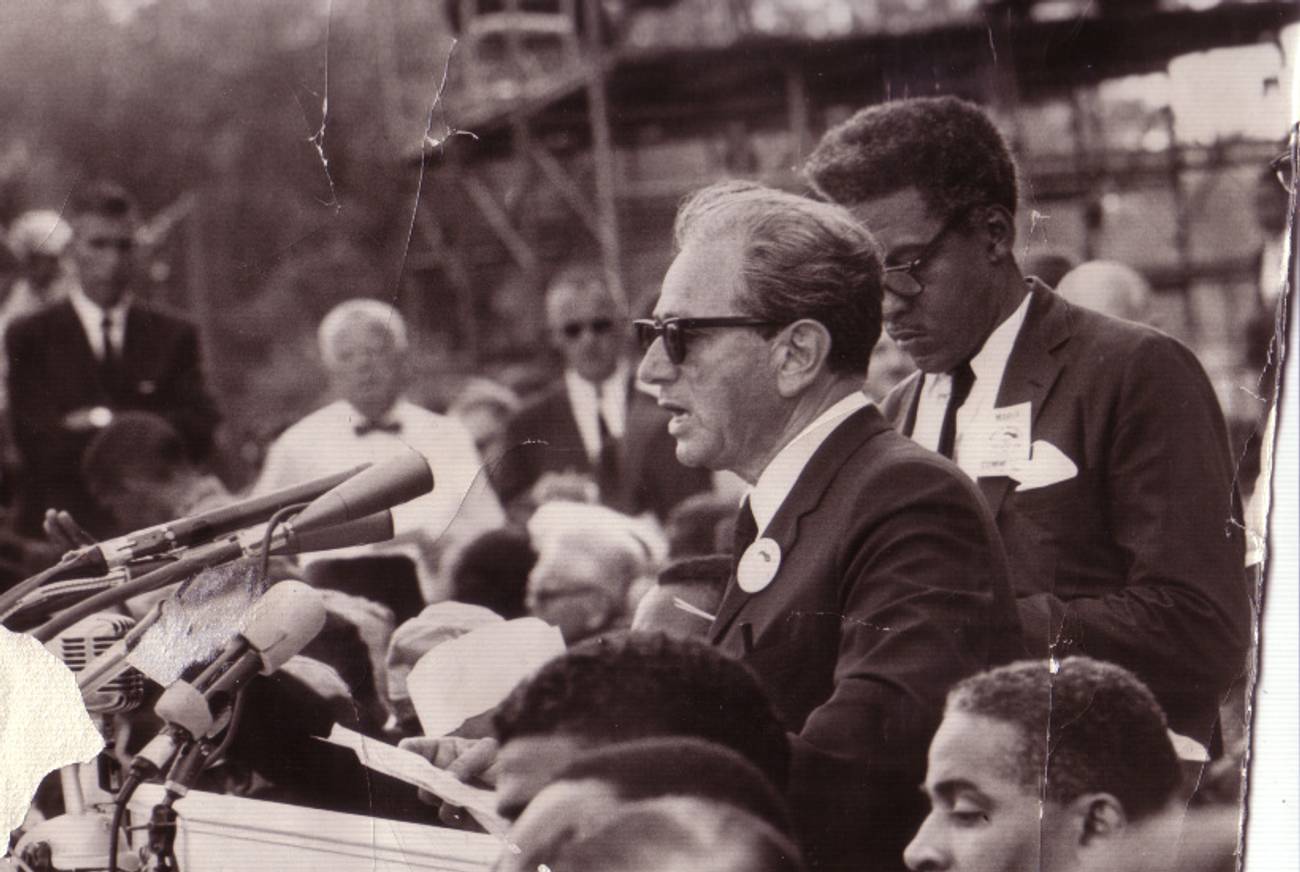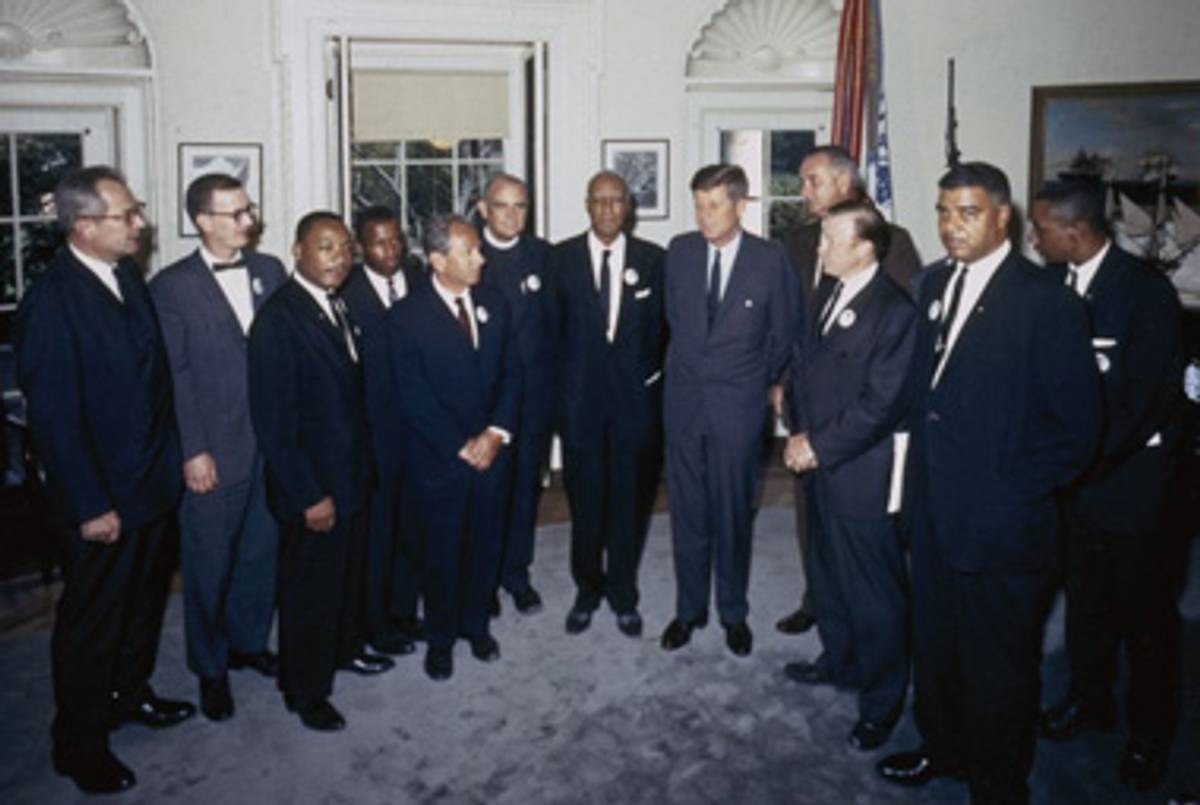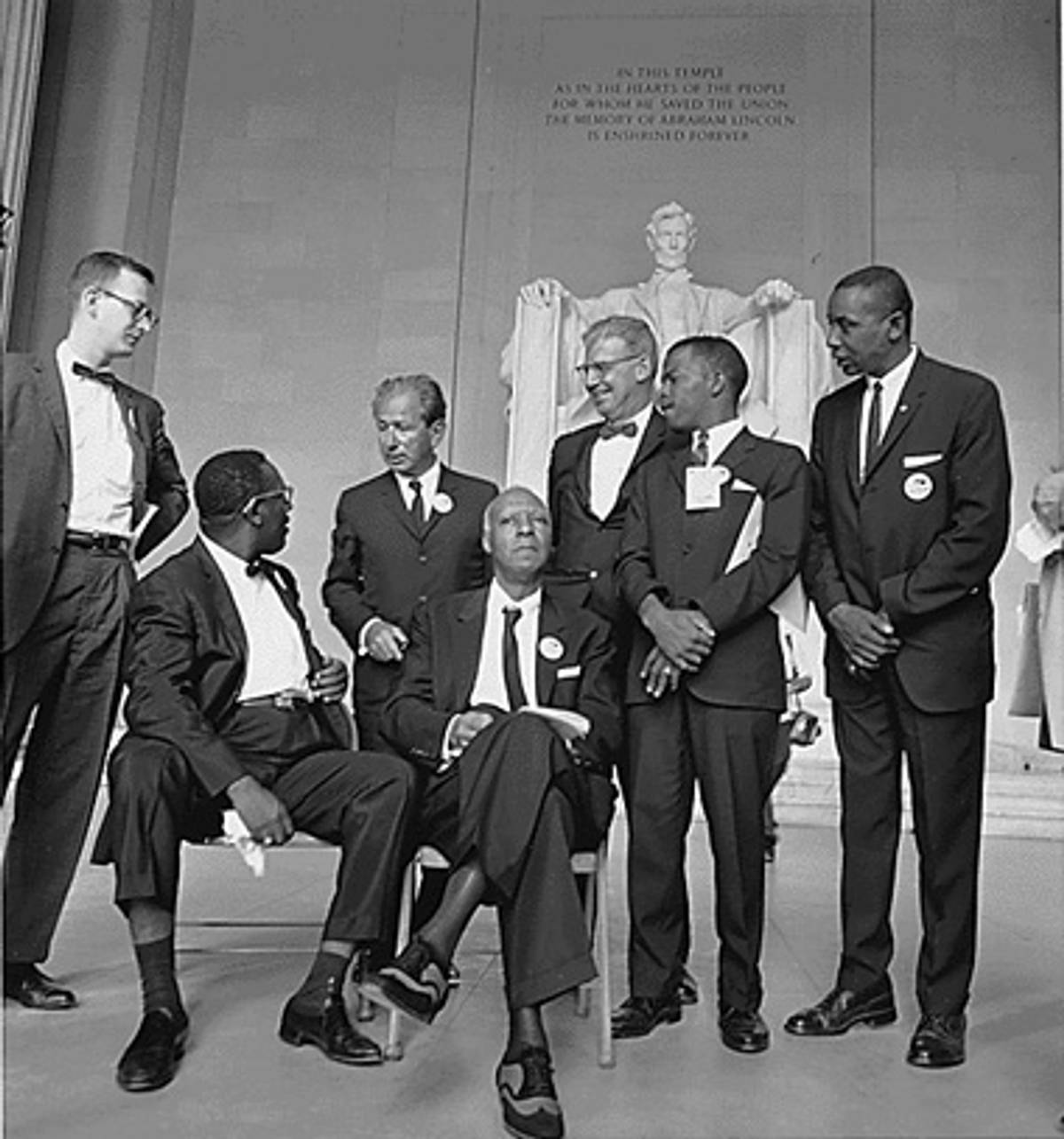The Plot for America: Remembering Civil Rights Leader Joachim Prinz
The influential Newark rabbi was a confidante of Martin Luther King, but he’s been all but ignored by history




On the evening of June 26, 1937, thousands of Berlin Jews packed the city’s grand Brüdervereinshaus to bid farewell to Rabbi Joachim Prinz, who had been ordered by the Gestapo to leave Germany immediately or face an almost certain death sentence for political subversion. Prinz had been the most popular, outspoken, and inspirational champion of Jewish national rights and Zionism in the dark years since the Nazis’ rise to power, preaching to overflow crowds at Berlin’s most important temples about the need to leave Germany and immigrate to Palestine. By the summer of 1937 he had already been arrested a half-dozen times by the Gestapo, but he always managed to elude deportation. This time, however, he was warned by his “friend” and informant, Gestapo Obersturmbanführer Kuchman, that his days were numbered, and he reluctantly decided to emigrate to the United States, sponsored by his friend and patron Rabbi Stephen S. Wise. Among the uninvited guests at Prinz’s farewell was a Nazi functionary, Adolf Eichmann.
Eichmann’s presence was to have important legal ramifications more than two decades later. In the initial discovery proceedings to establish Eichmann’s identity before his 1961 trial in Jerusalem, Benno Cohen, the foremost Zionist leader in pre-war Berlin, positively identified the defendant, testifying as follows:
We held a valedictory meeting to take leave of Rabbi Dr. Joachim Prinz who was leaving the country. He was one of the finest speakers, the best Zionist propagandist in those years. The large hall was packed full. The public thronged to this meeting. Suddenly, as chairman of the event, I was called to the door and my office clerk told me, “Mr Eichmann is here.” I saw this same man, for the first time in civilian clothing, and he shouted at me, “Who is responsible for order here? This is disorder of the first degree.” … I watched him the entire time from my place in the chair.
As a young rabbi in his late twenties, Prinz was already addressing congregations of thousands in Berlin’s largest temple, the magnificent Neue Synagogue on Oranienburger Strasse, whose stunning façade has recently been restored. And less than two years after arriving in the United States after his expulsion from Germany by Eichmann’s goons, he was appointed rabbi of New Jersey’s largest Jewish house of worship, the magnificent Greek Revival Temple B’nai Abraham, which towered over Newark’s then-fashionable and heavily Jewish Clinton Hill section, where hundreds of young people swarmed to hear his Friday-night orations.
As Prinz so evidently delights in repeatedly recalling in his posthumously published memoir, Rebellious Rabbi, the Jews of both Berlin and Newark—especially “the younger generation” to whom he mainly dedicated his ministries—did not so much “go to shul” for an encounter with the divine as they “went to Prinz” for an encounter with the rabbi. The combination of Prinz’s charismatic personality and his distinctly un-theological and nationalistic understanding of the essence of Judaism proved as attractive to the nervously Americanizing Jews of mid-20th-century New Jersey as it had been to the deeply assimilated and newly imperiled Jews of early Nazi Germany. Prinz’s nationalist theology was first expressed in his classic work of Jewish defiance, Wir Juden, which was published in Berlin in 1934 and quickly became a best-seller among Germany’s deeply demoralized Jews. He used his experiences leading the Jews of Nazi Berlin to develop an almost metaphysical notion of Jewish national identity, which he referred to as the “doctrine of Jewish inescapability.”
Prinz’s initial, exploratory visit to the United States, in March 1937, just a half year before his final emigration from Germany, was marked by all manner of disappointments with the “Golden Land.” Prinz complained bitterly about America’s complacence in the face of the threat posed by Nazi Germany. In his first recorded impressions of the country, he found almost nothing that compared favorably with his native Germany. America’s cities are depicted as ugly and rundown, racism against blacks disturbingly pervasive, its political culture naïve and intellectual life second-rate, and its people primitive and poorly dressed.
“My first impression with America was dreadful,” he wrote. Prinz arrived in Hoboken and described the scene as “not impressive, the houses were decrepit and the streets were dirty. The richest country in the world did not present itself to me as a place of glamour and prosperity.”
But, already during this first visit, Prinz was inspired by an unexpected section of New York—Harlem. “I remember being particularly interested in Harlem,” he wrote. “It was at that time that I heard for the first time what is now commonplace, namely speeches about Black Nationalism. Upon my return to Germany I wrote an article that was entitled ‘Zionism in Black.’ ”
And in June 1937, shortly before he finally emigrated with his family to the United States, Prinz published a stinging indictment of American racism, “Ámerika, hast du es besser?” in the Berlin liberal Jewish journal Der Morgen: “When people in New York City describe a neighborhood as being nice, they are not referring to its parks, trees or wide boulevards. They are talking about the fact that there are no blacks, Italians and Jews in that ‘nice’ part of the city.”
Prinz’s brave defiance of the Nazis, and his understanding of Jewish identity in primarily national, if not quite racial, terms, emboldened him to speak his mind when he encountered all forms of racism in the United States after he immigrated in August 1937. During his first foray outside New Jersey, to Atlanta, where he had been invited to address various Jewish organizations just three months after his arrival in the country, Prinz came face-to-face with Southern Jewish racism. Before his first engagement, speaking to members of the local Zionist leadership, Prinz scheduled a morning meeting with the Bible scholar and black Methodist bishop Willis Jefferson King, at the time professor of Old Testament at Gammon Theological Seminary, a black institution. Upon arriving in Atlanta, while making his way to King’s home, Prinz noticed a huge Coca-Cola sign, which at that time constituted Atlanta’s skyline, as the beverage company was the city’s largest business. Here is Prinz’s remarkable recollection of the subsequent events of that day:
After I left the Seminary, it was time for me to go and address a luncheon given in my honor by three Zionist groups. I was greeted by the people in charge of the affair and shortly thereafter one of them said to me, “I hear that you visited that nigger at the black seminary and even invited the nigger to dine with you tonight.” I was completely speechless. But I managed to respond that it was true that I visited with a great scholar and had a very interesting time with him. But I could not help adding that I was shocked to hear such words from a Jewish group welcoming a Hitler refugee. … I asserted that what was evidently happening to the black people of America was the very same thing that was happening to the Jews of Europe. There was an embarrassed silence … after which one of the Jews asked me: “Would the rabbi care for a drink?” … I immediately responded that I would like nothing better, hoping for a stiff alcoholic drink, not merely intoxicating but anaesthetizing for a pain I can hardly describe. Someone then brought me a glass of Coca Cola. That was the first time, and the very last time in my life that I drank Coca Cola. In all the forty years that have elapsed since 1937, Coca Cola was for me a symbol of hatred and prejudice with which I did not want to be identified.
Prinz could hardly have imagined at the time that more than a quarter of a century later he was to share these very same sentiments with what was to become the largest audience he, or any other American rabbi, was ever to address—the quarter of a million people who gathered on the National Mall for the “March on Washington for Jobs” on August 28, 1963, a historic event that Prinz often referred to in subsequent speeches and writings as the “most memorable religious experience of my life,” and of which he was one the principle organizers.
Following a stirring rendition of “I’ve Been Buked and Scorned” by the so-called Queen of Gospel, Mahalia Jackson (Prinz, clearly moved by Jackson’s performance, prefaced his speech by declaring, “I wish I could sing!”) and speaking just prior to Dr. King’s legendary “I Have a Dream” oration, Prinz mesmerized the marchers with a speech that was as bold as it was brief, and as inspiring as it was passionate. Opening with the words “I speak to you as an American Jew,” Prinz launched a powerful indictment of American silence in the wake of that era’s violent racism in the Deep South, an apathy that he controversially compared to the silence of “ordinary Germans” during the early years of the Third Reich.
(Curious about Prinz’s proud vow of cola abstinence, I’d contacted Prinz’s son, Rabbi Jonathan Prinz, who confirmed that Coca-Cola was not allowed in the Prinz family home. But he added a literally refreshing footnote. The day of the March on Washington was especially hot and humid, the younger Rabbi Prinz recalled. His father was parched after the speeches and joined other members of the roster at a VIP tent at the front of the Mall, in search of a cool beverage; to his dismay, the only drink available was Coca-Cola, which both rabbis Prinz happily consumed with great gusto.)

As his personal correspondence from the late 1950s indicates, Prinz was the first rabbi to reach out to Martin Luther King Jr. When Prinz was installed as President of the American Jewish Congress at its May 1958 convention in Miami, King was—at Prinz’s insistence—the keynote speaker. It was the first time the civil rights leader had ever addressed a white audience south of the Mason-Dixon line. Less than two years later, King addressed an overflow crowd from Prinz’s pulpit at B’nai Abraham in Newark, New Jersey’s most prestigious Jewish pulpit.
Prinz’s activism was widely criticized, and it must be said not entirely unreasonably, by neo-conservative Jewish intellectuals such as Milton Himmelfarb and Norman Podhoretz, and even more so by many conservative members of his own congregation. These members were especially troubled by what they derided as his public Civil Rights “stunts”; when, for example, in 1960, he organized and led the picket line in front of Woolworth’s flagship Manhattan store on Fifth Avenue to protest the store’s segregated lunch counters in the South. Prinz, who helped the Jews of Berlin withstand the Nazis’ anti-Jewish boycotts, regularly used his bully pulpit as the president of the AJC to urge boycotts of several major national department stores: Woolworth’s, Kress’s, Kresge’s, and Grant’s among them, issuing a statement on March 25, 1960, that proclaimed in the name of the AJC, “We do not accept the thesis that businesses may solicit the patronage of Negro customers in all other departments and deny them the right to equal service in the consumption of food and beverage. … We therefore support the call [to boycott] and add our voice.”
While the large majority of American Jewish leaders were growing cold toward the cause due to the rise of radical black identity politics that were inflected with no small degree of anti-Semitism, Prinz’s commitment, and his sense of personal affinity with the black experience in America, never waned, even after he was held up at knife-point by a black hitch-hiker he picked up while driving to Shabbat services at B’nai Abraham. (Prinz loved to recall that upon first seeing the knife pointed at his throat, he solemnly informed his assailant, “Young man, I’ll have you know that I marched with Dr. King,” to which his assailant responded, “Look, man, I don’t give a fuck who your doctor is; just give me your damn money!”) and later mugged by an intruder in his own office at B’nai Abraham.
Largely because of his insistence on not abandoning the deteriorating city, B’nai Abraham remained the last of Newark’s major synagogues to relocate to the suburbs west of the city, finally moving in 1973 to Livingston, where it thrives to this day. Newark’s leading Reform Temple, B’nai Jeshurun, led by the highly respected Rabbi Ely Pilchik, had already relocated in 1968 to a magnificent, indeed ostentatious, new building on a hilltop overlooking the suburb of Short Hills, a grand structure that featured a soaring pointed steeple. A few of Prinz’s congregants decided that showing Prinz this impressive new building might help convince him that B’nai Abraham ought to abandon Newark for a glorious future in the suburbs. Upon driving by B’nai Jeshurun and gazing up at the synagogue’s towering steeple, Prinz quipped that this was “Pilchik’s final erection.”
Prinz was especially embittered by his fellow rabbis’ abandonment of the Civil Rights cause. He concluded his keynote address to the 1970 national convention of the Conservative movement’s Rabbinical Assembly—although Prinz was trained at the Jewish Theological Seminary in Breslau, Germany, as a Conservative rabbi, he removed B’nai Abraham from the conservative movement, declaring the congregation, and himself, “independent”—by upbraiding the more than 250 rabbis present, and American Jews more generally, for having “retreated back into their own Jewish ghetto” abandoning what he continued to insist was an essentially Jewish moral cause:
Less and less do the lists of the peace movements and the movements of urban reform and those crying out against injustice and inequality for the Black community contain Jewish names. Most of the people, particularly you rabbis, have withdrawn into their comfortable ghettos. Instead of leading the people, you are following. Jews are among the most bigoted people in the world. Jewish leadership, instead of reprimanding them for it and cursing them up and down, as did the ancient Prophets, has followed their ranks.
Prinz’s identification with the plight of African Americans was inextricably bound with his own passionate, life-long commitment to Zionism. The earliest stirrings of black pride in America obviously touched a sensitive personal nerve in Prinz, whose road to Jewish religion and Zionism was a rocky one resisted by his grandfather, father, and hometown rabbi, just as civil rights was for many of the young black pioneers of the movement, who, especially in the deep south, rebelled against the long complacency of their elders. As he recalls in his memoir:
My Jewish emptiness, which was caused by the perfunctory and assimilationist Jewish attitude of my community, including my own father, left a void inside me that made me search for something to fill it. It was at that time that I began to discover that there was something in Jewish life that was new, but rejected by the vast majority of the Jewish people. It was the Zionist movement. I ordered Theodor Herzl’s The Jewish State from our bookstore, since the library of the Jewish community did not carry it. I read it feverishly, including the last sentence: “If you will it, it will not be a fairy tale.” … In speaking with my rabbi about it he warned me against such a foolish idea that could only lead to a Jewish disaster and create … a betrayal of the German patriotism to which we were all wedded.
Prinz recalls his father having a slice of ham with breakfast each day and describes him as “a great patriot and believer in Germany … an assimilated Jew to whom Zionism was anathema, who was religiously very mixed up … but aware of my oratorical talents.” When his father lay ill, mistakenly believing that he was on his deathbed (the most Jewish thing about the elder Prinz appears to have been that he was seriously psychosomatic), he asked Joachim to take a solemn oath swearing never to become a rabbi. In one of the memoir’s very few examples of conceding to the beliefs, or even sensitivities, of another human being, Prinz, with fingers crossed behind his back, obliged, “knowing that I was lying to him.”
Prinz, like many other famous Central European Jewish intellectuals of the interwar era—from Franz Kafka to Gershom Scholem—bristled at and rebelled definitively against their fathers’ and grandfathers’ assimilation. The experience of ministering over the return of deeply alienated and assimilated German Jews to their Jewish roots during the Nazi era not only deepened Prinz’s Zionist convictions but also shaped his thinking about the one unshakable belief that permeated his preaching and writings for the remainder of his life—the idea of the “inescapable” nature of Jewish identity. Though they might be able physically to hide their national identity in a way America’s blacks could not, all Jews—no matter how determined or desperate to escape it—were bound together by an inescapable destiny.
Aside from his Jewish identity, there was another matter that Rabbi Prinz seemed, at least personally, to find utterly inescapable: the male sexual drive. In his memoirs, Prinz repeatedly expressed disdain for the idea of monogamy. In the course of his overly lengthy and explicit recollections of his premarital sexual adventures, including those with the woman who was to become his first wife, Lucie (whom Prinz offers was sexually “very well trained and far superior to me,” having “herself invented” certain coital techniques previously unknown to humankind), there is the following description of their adolescent loss of innocence, which even Woody Allen might find too absurd to keep in a script: “I remember the first time we slept together was after a long walk through the woods, and our bed was the field. The moon was shining brightly, the stars were above us, and I thought of Kant’s famous line in his Critique of Pure Reason in which he discussed the relationship of moon, stars and the moral conscience.”

Prinz’s second wife, Hilde, whom he predeceased by six years and with whom he by all accounts, including his own, enjoyed a wonderful marriage, is also not spared. In his recollection of their honeymoon on a freighter bound for Italy, Prinz offers the following passage, which, as always, offers an exalted literary reference in connection with the act of coitus: “Hilde, young and pretty and I, young and handsome, spent a fantastic time on the boat which, of course, had much influence on the sex, helped along by the movement of the ocean. It reminded us of the poem dealing with the waves of the sea and the movement of the heart.”
Such evidence of Prinz’s taste for great sex and great writing—best experienced in mutual climax—might explain the fact that he alone among America’s leading rabbis was a very early admirer of Newark’s most notorious Jewish son, Philip Roth. While Roth’s sensational debut works, Goodbye Columbus in 1959 and, a decade later, Portnoy’s Complaint, earned him the immediate scorn of America’s most prestigious rabbis, and Roth’s name became synonymous with a particularly shmutzig form of Jewish self-loathing, Prinz was energetically promoting him. Prinz sponsored Roth’s first trip to Israel, in 1963, as part of the “Encounters” conferences that he organized as president of the American Jewish Congress, at which Roth appeared on a panel with Leslie Fiedler and the celebrated Israeli writer Aharon Megged.
History has not been terribly kind to Joachim Prinz; he has all but been forgotten, and he has not been the subject of a single scholarly study or biography. But his support of Philip Roth at the dawn of his literary career, utterly unique among his clerical contemporaries, has not gone unrewarded, resulting in his exposure to a vastly larger popular readership than that ever enjoyed by a rabbi, let alone a Jewish historian.
Rabbi Joachim Prinz emerges as the great Jewish hero and main opponent of the nefarious Jewish quisling of America’s fascist President Lindbergh, Rabbi Lionel Bengelsdorf, toward the end of Roth’s counter-historical novel, The Plot Against America. While Bengelsdorf is a fictional character, all the other rabbis who appear in the novel are historical figures, including Prinz’s most prominent colleagues in the Newark rabbinate. But, as is always the case in Roth’s writings, his portrait of these rabbis is more than a bit miserable—except for that of Joachim Prinz, who is the only one of the lot to stand up both to the Lindbergh Administration and to Rabbi Bengelsdorf, whose daughter’s wedding, alone among Newark’s rabbis, he boycotts. Roth writes, “Rabbi Prinz’s authority among Jews throughout the city, in the wider Jewish community, and among scholars and theologians of every religion had far exceeded his elder colleagues, and it is he alone of the rabbis leading the city’s tree wealthiest congregations who never flinched in his opposition to Lindbergh.”
And so when, in the novel, Newark’s Jews fear a pogrom, similar to those spreading like prairie fires across America, it is Prinz who rises to their defense by establishing the government-sanctioned Committee of Concerned Jewish Citizens—in unofficial tandem with his friend Longy Zwillman’s creation of an illicit Jewish militia that roams the Jew-lined streets of Weequahic and Clinton Hill. (Zwillman was in fact a member of B’nai Abraham, and Prinz officiated at his mob cohorts’ weddings and at Zwillman’s funeral.) The novel’s young protagonist imagines the murderous flood of anti-Semitic violence that would have overcome Newark’s Jews were it not for Prinz:
a nightmarish vision of America’s anti-Semitic fury roaring Eastward and surging onto Liberty Avenue straight into our alleyway and on up our back stairs like the water of a flood, had it not been for the sturdy barrier presented by the gleaming bay haunches of the horses of the Newark Police force, whose strength and speed and beauty Newark’s preeminent rabbi, the nobly named Prinz, had caused to materialize at the end of our street.
While ostensibly fictional, Roth’s projection of Prinz’s role in his nightmarish vision of the fate of Newark’s Jews in fascist America is perfectly consistent with the historical record of Prinz’s career, which Roth knew well. Indeed, the theme of one of Prinz’s earliest sermons at B’nai Abraham was a fierce denunciation of American fascism, during which he aimed particularly sharp jabs at Charles Lindbergh, Henry Ford, and their racist acolytes. Alas, rabbis of Prinz’s intellectual caliber, clarity of vision, and courage survive today almost only in the world of fiction.
Allan Nadler, a professor of religious studies and director of the program in Jewish Studies at Drew University, is currently a visiting professor of Jewish Studies at McGill University in Montreal, Canada.